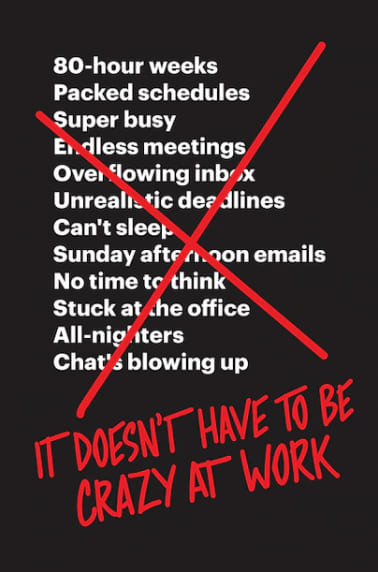It Doesn't Have to Be Crazy at Work
Jason Fried, David Heinemeier Hansson

In this timely manifesto, the authors of the New York Times bestseller Rework broadly reject the prevailing notion that long hours, aggressive hustle, and “whatever it takes” are required to run a successful business today.
In Rework, Jason Fried and David Heinemeier Hansson introduced a new path to working effectively. Now, they build on their message with a bold, iconoclastic strategy for creating the ideal company culture—what they call “the calm company.” Their approach directly attack the chaos, anxiety, and stress that plagues millions of workplaces and hampers billions of workers every day.
Long hours, an excessive workload, and a lack of sleep have become a badge of honor for modern professionals. But it should be a mark of stupidity, the authors argue. Sadly, this isn’t just a problem for large organizations—individuals, contractors, and solopreneurs are burning themselves out the same way. The answer to better productivity isn’t more hours—it’s less waste and fewer things that induce distraction and persistent stress.
It’s time to stop celebrating Crazy, and start celebrating Calm, Fried and Hansson assert.
Fried and Hansson have the proof to back up their argument. “Calm” has been the cornerstone of their company’s culture since Basecamp began twenty years ago. Destined to become the management guide for the next generation, It Doesn’t Have to Be Crazy at Work is a practical and inspiring distillation of their insights and experiences. It isn’t a book telling you what to do. It’s a book showing you what they’ve done—and how any manager or executive no matter the industry or size of the company, can do it too.
Key Summary
“It Doesn’t Have to Be Crazy at Work” is a book by the co-founders of Basecamp, Jason Fried and David Heinemeier Hansson. It provides practical advice for managing a company and creating a healthier work culture. The authors argue that the traditional notion of working long hours, prioritizing profit over people, and being in a constant state of crisis is unnecessary and harmful. Instead, they promote a calmer, more sustainable approach to work that values a good work-life balance, meaningful work, and a strong company culture.
Takeaways
1. The long hours and burnout culture in many organizations are not necessary or productive.
2. Companies should prioritize the well-being and work-life balance of their employees over maximizing profits.
3. A healthy company culture that values collaboration and teamwork is essential for success.
4. To avoid burnout, companies should focus on meaningful work and set clear priorities.
5. Set boundaries and limit the amount of work that is taken on.
6. Encourage communication and collaboration between team members.
7. Encourage a sense of ownership and autonomy among employees.
8. Regularly evaluate and improve processes and workflows to make work more efficient.
9. Promote a healthy work-life balance by limiting the number of hours worked and providing time off.
10. Lead by example and create a culture that prioritizes well-being, work-life balance, and meaningful work.